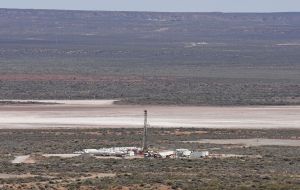MercoPress. South Atlantic News Agency
Argentina determined to promote oil and gas production and exports
 Dario Martinez took office on August 26 and discussed the plans for energy policy with Argentine President Alberto Fernandez
Dario Martinez took office on August 26 and discussed the plans for energy policy with Argentine President Alberto Fernandez  Argentina is putting greater focus on export growth, in particular oil from the giant Vaca Muerta shale play, to help pull the country out of a financial crisis
Argentina is putting greater focus on export growth, in particular oil from the giant Vaca Muerta shale play, to help pull the country out of a financial crisis Argentina’s new energy secretary Dario Martinez plans to promote oil and natural gas production with a view to increasing exports as part of a strategy to pull the economy out of one of its worst crises on record.
Martinez, who took office on August 26, discussed the plans for energy policy Aug. 27 with Argentine President Alberto Fernandez, according to a statement late that day.
Fernandez told Martinez to focus on increasing energy production “to adequately supply domestic needs, replace imports, and generate higher exportable balances that produce a growing favorable energy trade balance,” the statement said.
His administration has been putting greater focus on export growth, in particular oil from the giant Vaca Muerta shale play, as a key for bringing in much-needed dollars to help pull the country out of a financial crisis that started in 2012 and worsened in 2018. Most economists forecast that the economy will contract by more than 12% in 2020 and only slowly recover in 2021, largely because of a decline in activity during an already four-month lockdown of the economy for the coronavirus pandemic.
The need to ramp up exports was widely mentioned by Argentine authorities during a videoconference organized by the Americas Society and Council of Americas.
“We must increase our exports,” Foreign Minister Felipe Sola said at the event. “Argentina’s total exports are very low in relation to our potential.”
Miguel Angel Pesce, the central bank governor, stressed the potential for increasing exports of oil, gas and refined products as the world economy recovers from the pandemic.
“We hope that world demand will grow so that Argentina can develop all its export potential,” he said.
Vaca Muerta, one of the world’s largest shale deposits, has less than 10% of its acreage in full-scale development, according to government estimates.
In the first half of 2020, Argentina stepped up crude oil exports 33% to an average of 51,840 b/d, from 44,928 b/d in the year-earlier period, according to data from industry group Argentina Oil and Gas Institute.
The increase came largely because of a decline in demand during the lockdown, which began March 20 and has been extended to September 20. This cut local oil demand to as low as 200,000 b/d in April from a pre-pandemic average of 450,000-500,000 b/d, making it possible for producers to increase exports as Brent, the international reference price followed in Argentina, rebounded to US$ 45/b from less than US$ 30/b in April.
While oil production was still below the pre-pandemic levels of nearly 520,000 b/d as of August 28, its recovery to 469,384 b/d in July from a low of 445,614 b/d in May has made it possible to increase exports over existing infrastructure, a former Energy Secretariat advisor told S&P Global Platts.
“There is an excess capacity” on the pipeline to Puerto Rosales, an Atlantic port in southern Buenos Aires province, due east from Neuquen, the former advisor said.
He added that another pipeline to Chile, which has been out of use since the late 1990s, can also be revamped for exporting up to 100,000 b/d with an initial investment of US$ 5 million to US$ 10 million.
“If somebody wants to push this project ahead, within a window of a year that could happen,” he added.
Last week, Alejandro Monteiro, the energy minister of Neuquen, home to most of Vaca Muerta, said there is 360,000 b/d of proposed pipeline capacity that can increase oil exports from the Neuquen Basin as production grows. This includes a project by Oleoductos del Valle, a pipeline operator, that is under study to expand the pipeline system to Puerto Rosales for exporting 260,000 b/d, as well as the pipeline to Chile.




Top Comments
Disclaimer & comment rulesCommenting for this story is now closed.
If you have a Facebook account, become a fan and comment on our Facebook Page!